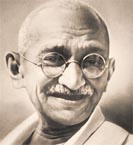Auction, protests put spotlight on Gandhi, non-violence
 New York/Washington - The iconic round-rimmed spectacles that Mahatma Gandhi said gave him the vision to free India are among several personal artefacts to be auctioned Thursday in New York, despite protests in India and an injunction from a New Delhi court.
New York/Washington - The iconic round-rimmed spectacles that Mahatma Gandhi said gave him the vision to free India are among several personal artefacts to be auctioned Thursday in New York, despite protests in India and an injunction from a New Delhi court.
The spectacles, a 1910 silver Zenith pocket watch, sandals, bowl, "thali" (plate) and letters of authenticity are to go under the hammer at 3:30 pm (2030 GMT) Thursday, New York-based Antiquorum Auctioneers said.
When asked if the sale would go forward despite Indian government objections, a spokeswoman told Deutsche Presse-Agentur dpa: "At this time, yes." She wouldn't comment on a meeting between Indian officials and James Otis, the California-based owner of the artefacts.
Mohandas Karamchand Gandhi, known as the Mahatma or "great soul," is widely revered as the father of the Indian nation and leader of India's struggle for independence from British rule.
In the 1930s, Gandhi is believed to have given the spectacles to an Indian colonel seeking inspiration. As he handed them over, Gandhi said they were the "eyes" that had given him the vision to free India.
Also part of the lot are the Indian leader's well-worn sandals, which he apparently gave to a British military officer in Aden, Yemen, during his 1931 trip from Bombay (now Mumbai) to London. The footwear was in exchange for photographs the officer had taken of Gandhi prior to the Round Table conference in London to discuss India's independence.
Gandhi presented his watch and other items in the 1940s to his grandniece and assistant, Abha Gandhi, in whose arms he died. He may have given up Western clothes for a homespun loin cloth, but still guarded his watch as he was a stickler for punctuality. Abha willed them to her daughter, Gita Mehta.
Gandhi might have frowned on both the auction and the row, as he led an austere life and gave up all his material possessions. "I do not believe I have any property," he wrote in his will.
But he also wrote that anything "which by social convention or in law is considered mine" was endowed to the Navajivan Trust that he founded in 1929 in Gujarat, the western Indian state where he was born.
The reserve price at Thursday's auction for his artefacts is between 20,000 and 30,000 dollars.
Indian diplomats had planned talks with the auction house and collector Otis, following protests by Indian parliamentarians and an injunction issued by the Delhi High Court. The outcome of those discussions were not immediately known.
The items "are an indivisible part of (India's) national heritage. They are closely associated with the sentiments of all Indians and belong to the nation as a whole," the Indian consulate in New York said in a statement.
The Delhi High Court on Tuesday issued an injunction to stop the auction, based on a petition filed by the Navajivan Trust, which said the artefacts could not be sold because they belonged to India and had been illegally taken away.
The Indian government said Navajivan was the "custodian of all properties belonging to Mahatma Gandhi," and the consulate had asked the auctioneers to cancel the sale of the items and donate them to India.
Otis, 45, a documentary filmmaker and "peace activist," told broadcaster CNN that he wanted to settle the row and hoped India was "willing to offer something very generous to India's poorest in exchange for the donation of the items. ... I would hope that the Indian government would offer something as great as Gandhi's cause."
With the auction set to take place Thursday, Otis said most of the proceeds would go toward "non-violence causes, causes that will promote the discussion and the debate about non-violence. That is where I believe Gandhi would have hoped this money would have gone."
"I am hopeful that Gandhi's belongings under auction will remind us all, especially (US President) Barack Obama, who has a picture of Gandhi in his office and has spoken highly of him, to learn to solve our international problems without violence."
Otis said he had received an email offer from the Indian consulate but deemed it to be too low.
Gandhi was born on October 2, 1869, in Porbandar, Gujarat state. He was assassinated by a Hindu extremist on January 30, 1948, months after realizing his dream of an India free from British rule. India became independent on August 15, 1947.
He believed in "satyagraha," or resistance through mass civil disobedience, and "ahimsa," or non-violence, both of which continue to inspire movements for civil rights and freedom across the world. He is known both as the Mahatma and "Bapu," which means father in his native Gujarati. (dpa)